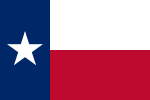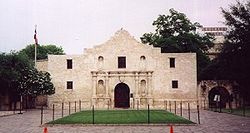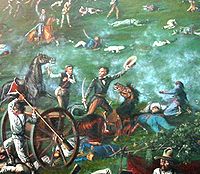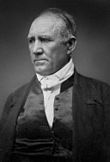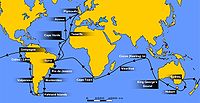- 1836
-
This article is about the year 1836.
Millennium: 2nd millennium Centuries: 18th century – 19th century – 20th century Decades: 1800s 1810s 1820s – 1830s – 1840s 1850s 1860s Years: 1833 1834 1835 – 1836 – 1837 1838 1839 1836 in topic: Humanities Archaeology – Architecture – Art – Literature – Music By country Australia – Canada – France – Germany – Mexico – South Africa – US – UK Other topics Rail Transport – Science – Sports Lists of leaders Colonial Governors – State leaders Birth and death categories Births – Deaths Establishments and disestablishments categories Establishments – Disestablishments Works category Works 1836
MDCCCXXXVIAb urbe condita 2589 Armenian calendar 1285
ԹՎ ՌՄՁԵAssyrian calendar 6586 Bahá'í calendar -8 – -7 Bengali calendar 1243 Berber calendar 2786 British Regnal year 6 Will. 4 – 7 Will. 4 Buddhist calendar 2380 Burmese calendar 1198 Byzantine calendar 7344 – 7345 Chinese calendar 乙未年十一月十三日
(4472/4532-11-13)— to —丙申年十一月廿四日
(4473/4533-11-24)Coptic calendar 1552 – 1553 Ethiopian calendar 1828 – 1829 Hebrew calendar 5596 – 5597 Hindu calendars - Bikram Samwat 1892 – 1893 - Shaka Samvat 1758 – 1759 - Kali Yuga 4937 – 4938 Holocene calendar 11836 Iranian calendar 1214 – 1215 Islamic calendar 1251 – 1252 Japanese calendar Tenpō 7
(天保7年)Korean calendar 4169 Minguo calendar 76 before ROC
民前76年Thai solar calendar 2379
Year 1836 (MDCCCXXXVI) was a leap year starting on Friday (link will display the full calendar) of the Gregorian Calendar and a leap year starting on Wednesday of the 12-day slower Julian calendar.Events
January–March
- January 5 – Davy Crockett arrives in Texas.
- January 12 – HMS Beagle with Charles Darwin reaches Sydney.
- January 18 – Dade County, Florida, is formed.
- February 23 – The Alamo is surrounded by Santa Anna's army, in a 13-day ordeal.
- February 25 – Samuel Colt receives an American patent for the Colt revolver, the first revolving barrel multishot firearm.
- March 1
- Antonio García Gutiérrez's play El Trovador is performed for the first time in Madrid, Spain.
- A Convention of 57 delegates from Texas communities gathers in Washington-on-the-Brazos, Texas, to deliberate independence from Mexico.
- March 6 – The Battle of the Alamo ends; 182 Texans are slaughtered by about 5,000 Mexicans.[1]
- March 17 – Texas abolishes the slave trade.
- March 27 – U.S. Survey of the Coast returned to U.S. Treasury Department; renamed U.S. Coastal Survey.
April–June
- April 20 – The Territory of Wisconsin is created.
- April 21 – Battle of San Jacinto: Mexican forces under General Santa Anna are defeated at San Jacinto, Texas.
- April 22 – Texas Revolution: A day after the Battle of San Jacinto, forces under Texas General Sam Houston capture Mexican General Antonio López de Santa Anna.
- May 7 – The settlement of Mayagüez, Puerto Rico is elevated to the royal status of villa by the government of Spain.
- May 15 – Francis Baily, during an eclipse of the sun, observes the phenomenon named after him as Baily's beads.
- May 19 – Fort Parker massacre: Among those captured by Native Americans is 9-year-old Cynthia Ann Parker; she later gives birth to a son named Quanah, who becomes the last chief of the Comanche.
- June 15 – Arkansas is the 25th state admitted into the United States of America.
July–September
- July 13 – The first numbered U.S. patent #1 (after filing 9,957 unnumbered patents) is granted, for locomotive wheels.
- July 20 – Charles Darwin climbs Green Hill on Ascension Island.
- July 21 – The first Canadian railroad opens, between Laprairie and St. John, Quebec.
- July 27 – Adelaide, South Australia is founded.
- July 30 – The first English newspaper is published in Hawaii.
- August 17 – The HMS Beagle with Charles Darwin leaves South America, headed back to England.
- August 30 – The city of Houston, Texas is founded.
- September 1 – Rebuilding begins at the Synagogue of Rabbi Judah Hasid in Jerusalem.
- September 5 – Sam Houston is elected as the first president of the Republic of Texas.
- September 11 – Rio-Grandense Republic is proclaimed in South America.
October–December
- October 2 – Charles Darwin returns to Britain aboard the HMS Beagle with biological data he will later use to develop his theory of evolution.
- October 22 – Sam Houston is inaugurated as first elected President of the Republic of Texas.
- October 24 – A. Phillips patents the match.
- October 25 – Construction begins on the Wilmington and Raleigh Railroad in North Carolina. Due to a lack of support in Raleigh, the route is revised to run from Wilmington to the Petersburg Railroad in Weldon.[2]
- December 4 – Whig Party holds its first national convention, in Harrisburg, PA.
- December 7 – U.S. presidential election, 1836: Martin Van Buren defeats William Henry Harrison.
- December 15 – The U.S. Patent Office (USPTO) burns in Washington, DC.
- December 26 – The colony of South Australia is officially proclaimed (now celebrated in the state of South Australia as Proclamation Day).
- December 27 – An avalanche at Lewes in Sussex, England kills 8 of 15 people buried when a row of cottages is engulfed in snow.
- December 28 – Spain recognizes the independence of Mexico.
- December 30 – In Saint Petersburg, the Lehman Theater catches fire, killing 800 people.
Date unknown
- The first printed literature in Assyrian Neo-Aramaic is produced by Justin Perkins, an American Presbyterian missionary.
- The New Board brokerage group is founded in New York City.
- Parliament passes a law making census data available to the public (a boon for genealogists and historians).
- James Peter Allaire's company, the Howell Works, is at its peak.
- George Catlin ends his 6-year tour of 50 tribes in the Dakota Territory.
- Chatsworth Head found near Tamassos on Cyprus.
Births
January–June
- January 2 – Mendele Moykher Sforim, Russian Yiddish writer (d. 1917)
- January 10 – Charles Phillip Ingalls, Pioneer father of author Laura Ingalls Wilder (d. June 8, 1902)
- January 14 – Henri Fantin-Latour, French painter (d. 1904)
- January 27 – Leopold von Sacher-Masoch, Austrian writer (d. 1895)
- February 16 – Robert Halpin, Irish mariner and cable layer (d. 1894)
- February 18 – Ramakrishna Paramhansa, Bengali religious leader (d. 1886)
- February 21 – Léo Delibes, French composer (d. 1891)
- February 24 – Winslow Homer, American painter. 1910)
- March 12 – Isabella Beeton, British cook and expert on household management (d. 1865)
- March 20
- Ferris Jacobs, Jr., American politician (d. 1886)
- Sir Edward Poynter, French-born artist (d. 1919)
- April 27 – Major Charles Bendire, U.S. Army captain and ornithologist (d. 1897)
- May 23 – Touch the Clouds, native American chieftain of Teton Lakota Sioux.
- May 27 – Jay Gould, American financier (d. 1892)
- May 28
- Alexander Mitscherlich, German chemist (d. 1918)
- Friedrich Baumfelder, German composer, conductor, and pianist (d. 1916)
- May 31 – Jules Chéret, French printmaker (d. 1932)
July–December
- July 8 – Joseph Chamberlain, British politician (d. 1914)
- July 9 – Camille de Renesse, Belgian Count (d. 1904)
- August 13 – Bishop Nikolai of Japan, Russian Orthodox priest (d. 1912)
- August 25 – Bret Harte, American writer (d. 1902)
- September 7 – Henry Campbell-Bannerman, Prime Minister of the United Kingdom (d. 1908)
- September 11 – Fitz Hugh Ludlow, American author (d. 1870)
- September 17 – William Jackson Palmer, founder of Colorado Springs, Colorado (d. 1909)
- September 26 – Thomas Crapper, plumber, inventor (d. 1910)
- October 15 – James Tissot, French artist (d. 1902)
- November 11 – Thomas Bailey Aldrich, American poet and novelist (d. 1907)
- November 18 – W. S. Gilbert, British playwright and librettist best known for his collaborations with Arthur Sullivan (d. 1911)
Deaths
January–June
- January 1 – Bernhard Meyer, German physician and ornithologist (b. 1767)
- January 11 – John Molson, Canadian entrepreneur (b. 1763)
- January 30 – Betsy Ross, Made the first American flag (b. 1752)
- January 31 – John Cheyne (physician), British physician, surgeon and author (b. 1777)
- February 18 – Cornplanter, Seneca chief (b. 1750)
- March 6 (at the Alamo)
- Davy Crockett, American frontiersman, Congressman and soldier (b. 1786)
- William Barret Travis Texan revolutionary (b. 1809)
- James Bowie Texan revolutionary (b. 1796)
- March 16 – Nathaniel Bowditch, American mathematician (b. 1773)
- March 27 – James Fannin, Texas Revolutionary (b. 1804)
- April 29 – Simon Kenton, frontiersman; American Revolutionary militia general (b. 1755)
- June 10 – André-Marie Ampère, physicist (b. 1775)
- June 28 – James Madison, 4th President of the United States (b. 1751)
July–December
- August 21 – Claude-Louis Navier, French engineer and physicist (b. 1785)
- August 26 – Jeremiah Colegrove, Continental Army officer (b. 1758)
- September 5 – Ferdinand Raimund, Austrian playwright (b. 1790)
- September 12 – Christian Dietrich Grabbe, German playwright (b. 1801)
- September 14 – Aaron Burr, Vice President of the United States (b. 1756)
- September 17 – Antoine Laurent de Jussieu, French botanist (b. 1748)
- November – Tenskwatawa, Shawnee prophet and political leader (b. 1775)
- November 5 – Karel Hynek Mácha, Czech poet (b. 1810)
- November 6 – King Charles X of France (b. 1757)
- November 16 – Christian Hendrik Persoon, Dutch mycologist (b. 1761)
- December 27 – Stephen F. Austin, American pioneer (b. 1793)
References
- ^ Numbers from The World Book Encyclopedia, (C) 1970, U.S.A., Library of Congress catalog card number 70-79247
- ^ CommunicationSolutions/ISI, "Railroad — Wilmington & Raleigh (later Weldon)", North Carolina Business History, 2006, accessed 1 Feb 2010
Categories:
Wikimedia Foundation. 2010.

